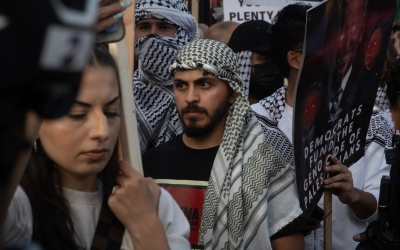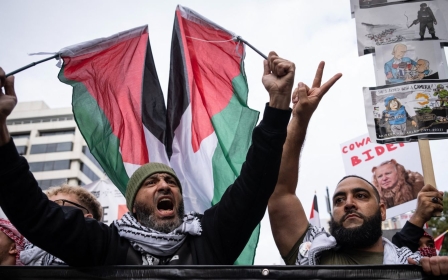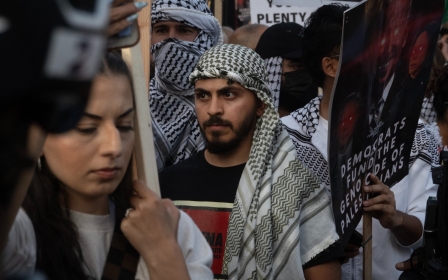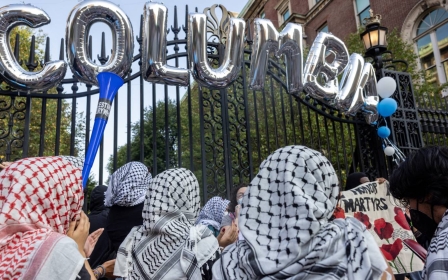How the US revived ‘war on terror’ era surveillance to suppress pro-Palestine movement
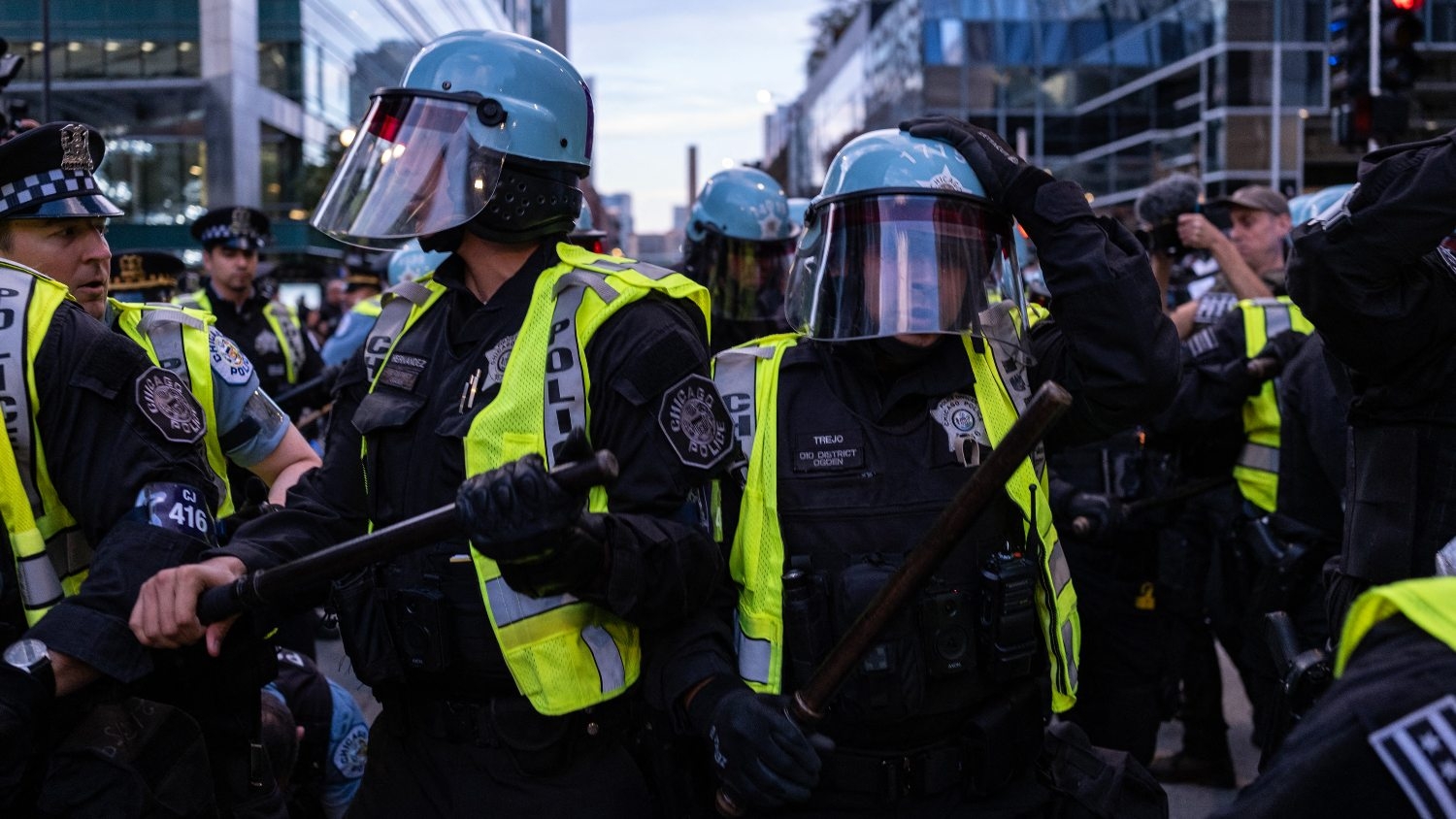
Osama Abu Irshaid was returning home to the US from an international trip in June when he was stopped by customs officials at Dulles International Airport in Virginia.
The interrogation by US officials at the airport puzzled Abu Irshaid. While he's not a stranger to these kinds of stops - he had been on a government watchlist until 2017 - Abu Irshaid told Middle East Eye that he had been given TSA pre-check status for years, allowing him to bypass the long lines at airport security.
But since Israel's war on Gaza began last October, Abu Irshaid, who is the executive director of American Muslims for Palestine, has witnessed a campaign of surveillance and repression launched by both the US government, private companies, and university campuses.
He was placed on the watchlist again, but now he says his family is also on it.
"This time, I'm back on it (the watchlist) because of my vocal position against the genocide that is taking place in Gaza," Abu Irshaid told MEE.
New MEE newsletter: Jerusalem Dispatch
Sign up to get the latest insights and analysis on Israel-Palestine, alongside Turkey Unpacked and other MEE newsletters
After a year of Israel waging war on Gaza with no end in sight, another battle is taking place inside the United States, one that is trying to silence Muslims, Arabs, activists and others speaking out in support of Palestinians and against the war.
The government surveillance reminds many of the weeks and months immediately following the 9/11 attacks and the ensuing US "war on terror", when Muslim communities saw law enforcement conduct massive sweeps of their neighbourhoods and the FBI came knocking on their doors.
"The American government has failed on the security front and failed on the values front. They failed on the security front because they assume that Muslims are the source of terrorism," Abu Irshaid said.
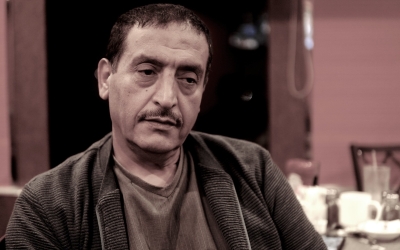
Amal Thabateh, an attorney at CLEAR, a legal nonprofit and clinic at the City University of New York, told MEE that over the past year, their clinic has seen an uptick in government surveillance against Palestinians and others living in the US who are expressing support for Palestinians. According to Clear, it has been in the form of increased FBI contact, scrutiny at US airports and borders and questioning when these individuals apply for immigration benefits.
"Agents approach our clients at their homes, at work, and in their communities to question them about their political activism and their views on the conflict abroad," Thabateh told MEE.
Thabateh added that there have been several cases of US government officials scrutinising their clients during travel, "all in apparent connection with their speech supporting Palestinian rights or criticising the Israeli government".
Reports also began to emerge soon after the war began saying that the US government was detaining Palestinians living in the US.
"We did have reports early on of at least one individual in Michigan who was Palestinian, who was undocumented, who was going through the monitoring process. He was held for several days in ICE custody without the benefit of having his attorney present," Amy Doukoure, an attorney with the Council on American-Islamic Relations' Michigan chapter, told MEE.
"He was interrogated by the FBI while he was in custody at one of the jails in Michigan."
Amy said there were other instances where individuals in Michigan have been questioned about Palestinians that they know who are US citizens.
Labelling groups in solidarity with Gaza as terrorists
One group of people that has been specifically targeted by government surveillance in recent months has been the Yemeni-American community.
The Yemeni community in the US has spent the last decade witnessing the horrors of the war between the Saudi-led coalition and the Houthi movement.
Now, following the massacres coming out of Israel's war on Gaza, members of the Yemeni community have been approached for questioning by the FBI.
'We do know that the FBI is out here once again, doorknocking and asking questions...related to monitoring our communities'
- Amy Doukoure
Following Israel's war on Gaza, the Houthi movement in Yemen launched a blockade in the Red Sea of Israel-linked ships travelling to and from the US, in what they say is in solidarity with Palestinians.
In January, the Biden administration placed the Houthis back on its list of "specially designated terrorist groups".
Amy Doukoure says that the FBI was questioning Yemenis in the area about their foreign policy positions.
"Yemeni individuals in our area are being questioned about their foreign policy proclivities, and more specifically about what they know and feel about the Houthis," Doukoure told MEE.
"We do know that the FBI is out here once again, doorknocking and asking questions not related to crime investigations but more related to monitoring our communities."
MEE tried reaching out to one of the individuals who had been approached by the FBI, but they declined to speak.
'A very long next chapter in surveillance'
One of the most severe examples of this type of surveillance against pro-Palestinian activity has been on university campuses, which have also been the site of mass protests as well as student-led encampments protesting both the war on Gaza and university investments in companies profiting off the war.
Several reports have shown how university administrations have obtained additional surveillance tools since the Covid-19 pandemic, which are now being utilised against individuals involved in campus protests.
The Nation obtained documents from Yale University in May showing how students on campus were spied on in an effort coordinated between university administration and law enforcement.
At the University of Chicago, students are suing the institution, in part because they accuse the university's police of using surveillance to discriminate against students involved in pro-Palestinian activities on campus.
"We're just seeing the very beginnings of what is going to be a very long next chapter of state surveillance of Palestine organising," Diala Shamas, senior staff attorney with the Center for Constitutional Rights, told MEE.
One part of this new chapter Shamas referred to is the additional layer of private entities utilising surveillance and repression tactics aimed at ostracising and punishing individuals, particularly students, for showing support for Palestine.
Reports over recent months have shown that participation in Gaza solidarity protests or other pro-Palestinian actions became a disqualifying factor for applicants at a myriad of companies. In a survey of more than 1,200 business leaders, more than 20 percent said they'd be reluctant to hire college graduates who had attended a pro-Palestinian rally.
Exhausting the resources of pro-Palestine groups
Another page of this most recent chapter in repression is the utilisation of the US court system to target pro-Palestinian groups.
While pro-Israel groups have been filing civil lawsuits against pro-Palestinian groups for years, there have been several of these types of lawsuits filed since Israel's war on Gaza began. One lawsuit, in particular, is targeting American Muslims for Palestine and Students for Justice in Palestine.
The lawsuit accuses the groups of being in contact with Hamas, which the US lists as a terrorist group.
"These lawsuits, they have no basis. They just want to overwhelm us. Basically, they just want to shut us down. For them, they're hoping that we'll get to a point where we cannot afford to push against these lawsuits," Abu Irshaid said.
He added that the groups filed the lawsuit in a civil court and not a criminal one, which Abu Irshaid shows the weakness of the claims being presented.
"Why do they bring civil lawsuits? They know a criminal lawsuit will be litigated faster than a civil lawsuit," he said.
"If you're guilty, then you're convicted maybe in a few months. And if you're not guilty, you will be cleared in a few months. That's not their intention. They want to make sure that they exhaust us throughout the years coming."
The CCR's Shamas, who has been defending the US Campaign for Palestinian Rights in a similar kind of lawsuit brought by the Jewish National Fund, said that these kinds of lawsuits are primarily a method of draining the resources of pro-Palestinian groups and creating a negative public perception about them, rather than convicting them.
"The problem is ultimately always going to come down to resources," said Shamas.
"Do you have teams of lawyers lined up who will do these cases pro bono? The answer is currently no, and that's how the other side tends to win."
One aspect of this new campaign of targeted surveillance that is different from years past is the level of resilience from many of the Palestinian, Arab, Muslim, and solidarity activists who have been out on the streets continuing to protest week in and week out.
Groups like the New York-based Within Our Lifetime, which has been banned from social media platforms like Instagram, are continuing to draw thousands of people to its pro-Palestine rallies.
"Despite those fears, we're still seeing certainly Palestinians, as well as those who are in solidarity with them, understand that the stakes are so high that it's important to kind of overcome those fears, even if it does bring law enforcement scrutiny," Shamas said.
Middle East Eye delivers independent and unrivalled coverage and analysis of the Middle East, North Africa and beyond. To learn more about republishing this content and the associated fees, please fill out this form. More about MEE can be found here.


